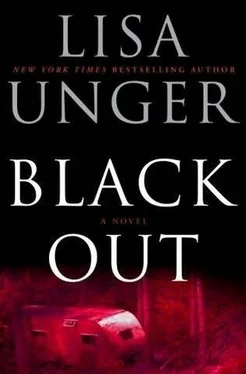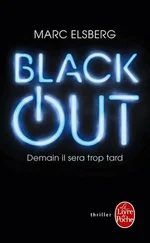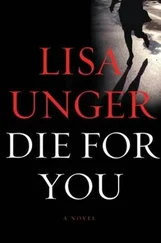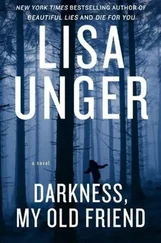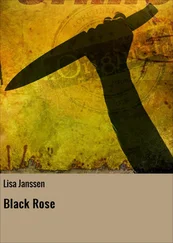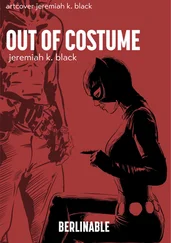The boat is pitching horribly now, and I cling to the rail on the wall as I make my way back to my cabin. The wind is wailing, and I think of Dax on his little boat and wonder how he is faring in the big waters and if he’ll survive, if he’ll come back for me. My stomach is in full mutiny, and I hold back vomit as I move through the door, pull it closed behind me, and resume my crouch in the small triangle of space that will be created when the door swings open. I listen to the wind and the churning water.
It isn’t long before I hear the thrum of a powerful boat engine, then footfalls on the deck above me. I take the gun from my waist and am comforted by its heft. I am aware of a tremendous sense of relief, something akin to the euphoria that sweeps over me when a migraine has passed, the wonderful lightness that follows the cessation of pain. It feels good to be Ophelia again, to face the things that Annie never could. My memories have come back to me; I remember it all. I am not proud, but I am whole, at last.
It was Gray who gave me the name Annie Fowler. It was someone from his company who created the documents I needed-driver’s license, passport, Social Security card-to move about the world as someone else. But I made Annie what Ophelia always wanted to be-a wife and mother with a big house and a beautiful child, a husband who cherished her-someone totally different from who her mother had been. Annie had a past unmarred by shame and regret; she was not haunted by the things she had done or the things that had been done to her. I became Annie-rich and pampered, dependent on Gray for strength, dependent on Victory for a feeling of purpose. Like everyone else in her life, I abandoned Ophelia, left her to die in a fiery blaze.
As the heavy footfalls draw closer, I am grateful that Ophelia has returned. She is so many things that Annie was not. She is temperamental where Annie was cool. She is angry where Annie was numb. And unlike Annie, the loving wife and doting mother, princess of suburbia, Ophelia March is a stone-cold killer.
They’re kicking open doors now; there’s more than one man on this boat, and they’re searching the cabins one by one. I don’t know how many men or how many cabins they have to go before they get to mine. But I’m ready.
When they kick my door open and enter the room, I wait for the door to swing back before opening fire. There are two men, both wearing black paramilitary gear-mask, vests, boots. I get one of them in the shoulder, and he issues a terrible scream. The other one takes a round in the vest and is knocked back hard against the wall with a groan. I break from the room but am surprised in the hallway by two more men. They disarm me quickly and bind my arms, slip a heavy hood over my head. It happens so fast I’m in darkness before I even know what hit me. I hear a dull thud, then see a flash of white. Before I lose consciousness, I have enough time to wonder if there’s more to what is happening here than I have imagined. I see my daughter’s face, then nothing.
It’s not terribly hard to take a life. Or anyway, not as hard as you’d imagine. There are those who would tell you I was not in my right mind, that I had dissociated from reality, from myself, on the night I made this discovery. But I’m not so sure. In my memories I am quite willing. Of course, all I did was leave the gate open. But that was enough, wasn’t it?
I don’t remember feeling anything, less than a week later after the night out in the woods, as I walked the drive on the horse farm to open that gate. I was basically sleepwalking.
Marlowe told me to wait until the house was quiet, to get to the gate before midnight. I wasn’t afraid of the long road or the errand before me. And as I let the gate swing open before I walked back to the stable, where I was supposed to meet Marlowe, I didn’t feel any anticipation or excitement or dread-I just felt empty. Even when a black sedan passed me with its lights off, slow and deadly like a shark through dark water, I observed it with detachment.
All the lights in and around the house were off, and a heavy quiet blanketed the night; even my soft footfalls seemed to echo. In the stable the horses were restless in their stalls again. I heard them shuffling, exhaling loud breaths from their nostrils. But Marlowe was nowhere in sight. The black sedan, a Lincoln I recognized as belonging to one of the protesters, was parked to the side of the barn, its engine clicking as it cooled.
Something about that sound brought me into the reality of what we were about to do. I felt as though I’d been startled awake. That’s when I noticed a flickering orange glow in the windows that had been dark just moments before. The scent of burning wood began to fill the air. I started running toward the house, my legs feeling impossibly slow and heavy, the house seeming so far away. As I burst through the door, the air was already thick with smoke.
“Mom!” I yelled, grabbing the banister and racing up the stairs. I covered my mouth and nose with my arm, but the smoke was insidious, burning my eyes, clawing at the back of my throat. By the time I got to the top landing, I was coughing and light-headed.
I found my mother alone in her bed, passed out cold, oblivious to the fire raging through the house. I don’t know what I thought would happen to her in all this, but I couldn’t leave her to die. I shook her but couldn’t rouse her. Finally I dragged her until she stumbled from the bed, leaning her full weight on me.
“What’s happening?” she muttered.
“There’s a fire!” I yelled, struggling to get to the door. “Where’s Frank?”
But she didn’t seem to hear. “Ophelia,” she slurred, “let me sleep.”
I dragged her into the hall, where through the smoke I saw two figures on the staircase, one long and lean, the other smaller by far but holding a gun. The taller was Frank, halfway up the stairs, probably headed up to get my mother. Where he’d been, I had no idea. But he’d stopped and turned to face the figure behind him. As I moved closer, I recognized. There was a wild look to Janet Parker, desperate and so, so sad. She doesn’t care what happens to her, I thought. Her whole body was rigid, as though it took the strength of all her muscles to hold that gun steady.
“You’re making a mistake, ma’am,” Frank said soothingly. He had one hand lifted as if to deflect the shot. His eyes fell on us.
The scene seemed to sober my mother a bit. “What’s happening?” she said, groggy and confused. “Frank, what’s going on?”
“You let my wife and her daughter leave the house,” he said to Janet Parker. “They’re innocent here.”
I heard a crash come from behind us, and the shattering of glass. My mother let go a little scream.
“Let them leave,” Frank said again. “They’ve got nothing to do with any of this.”
Janet Parker nodded at us, barely seeing us, and I grabbed my mother’s arm, dragged her toward the staircase.
“What are you doing?” my mother yelled as we moved past Frank down the stairs. My mother reached for Frank, and he clasped her to him, then pushed her away.
“Go,” he told her.
I saw then that they truly loved each other, and it shocked me. I’d seen them as these sick, damaged people who had formed an insane union. It never occurred to me that they’d actually cared for each other.
“The only peace I had was knowing you’d burn in hell for what you done!” Janet Parker yelled when we reached the bottom of the stairs. These were almost exactly the words she’d said at the trailer park.
“I didn’t kill your child, ma’am. I’ve never killed anyone. I swear it.” He sounded so sincere I almost believed him.
“Frank!” my mother shouted as I dragged her out the door and away from the house. I could see the flames coming out of the roof now, and as we watched, my bedroom window blew out, raining glass onto the ground below. I stood staring, disbelieving my own eyes. The house was burning. Where was Marlowe?
Читать дальше
